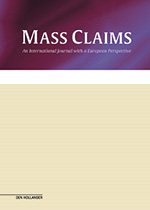To Settle or Not to Settle; That's the Question
Ruud Hermans
An Economic Analysis of the Factors Determining the Settlement of Mass Damage Disputes and Implications for Legal Practice
1. Introduction
In many cases, large numbers of victims have suffered or continue to suffer damages for which a limited number of parties are deemed responsible, at least from the victims' perspective. This constitutes mass damage, which requires collective redress to be resolved. Collective redress for mass damage refers to dispute resolution (a) on behalf of or for the benefit of a large number of victims, (b) against a limited number of defendants and (c) involving the same factual or legal issues. Typically, although not necessarily, one or more claim organisations are also involved. These include both interest groups as referred to in Article 3:305a of the Dutch Civil Code ("DCC") and other legal entities which consolidate claims, e.g by assigning their claims or providing a proxy to the claim organisation. ...
U heeft op dit moment geen toegang tot de volledige inhoud van dit product. U kunt alleen de inleiding en hoofdstukindeling lezen.
Wanneer u volledige toegang wenst tot alle informatie kunt u zich abonneren of inloggen als abonnee.
Verder in dit artikel:
An Economic Analysis of the Factors Determining the Settlement of Mass Damage Disputes and Implications for Legal Practice
1. Introduction
2. Problem Statement
3. The Use of Law and Economics Models and the Assumptions on Which They Are Based
4. Settlement of a Dispute between a Plaintiff and a Defendant
4.1. Basic Model
4.2. Implications for the Baseline Model when Parties Have Different Expectations about the Likelihood of Success in Litigation
5. Settlement of a Mass Damage Dispute
5.1. Baseline Model
5.2. Implications for the Baseline Model when Parties Have Different Expectations about Litigation Chances
5.3. Uncertainty about the Number of Victims Entitled to Compensation
5.4. Damage Assessment in a Mass Damage Dispute in a Collective Settlement and Collective Litigation
5.4.1. Introduction
5.4.2. Scalability of Determining Victims' Entitlements
5.4.3. The Benchmark for a Collective Settlement: Expected Net Proceeds of an Individual Lawsuit
6. The Time Involved In Settling the Mass Damages Dispute
7. Policy Implications
7.1. Introduction
7.2. Scalability of Determining Victims' Claims in a Collective Settlement
7.2.1. Introduction
7.2.2. Solutions to Achieve Decisions That Are More Scalable
7.3. Different Expectations about the Net Outcome of the Procedure
7.4. Acceleration of Mass Damages Procedures
8. Conclusion
9. Conflicts of Interest


